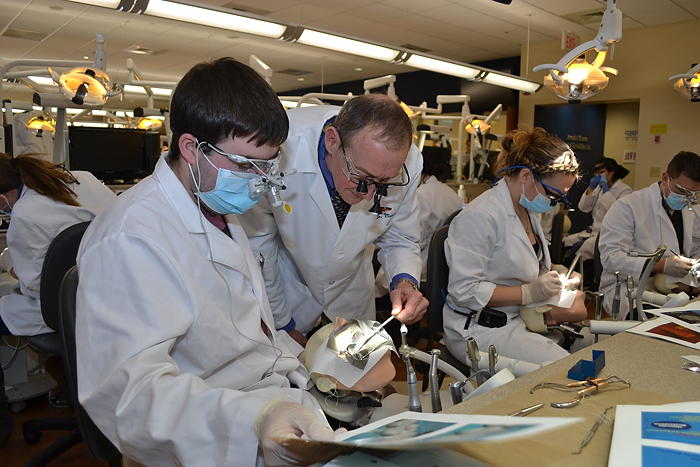The road to dental school isn’t always so straight forward and according to the American Dental Education Association (ADEA) an increasing number of students are entering dental programs later in life perhaps after a career in a different field prior to deciding to pursue dentistry or just after taking a few years to work after undergraduate studies before applying.
A non-traditional path to applying to dental school may seem daunting but rest assured it’s NOT impossible!

Dr. Jonathan Meiers (second from left), professor and chair of the Division of Operative Dentistry, assists second-year dental student John Walsh. (Tina Encarnacion/UConn Health Center Photo)
Required Coursework
Keep in mind the classes all dental schools require you to complete (including corresponding labs)
-two semesters of biology
-two semesters of general chemistry
-two semesters of organic chemistry
-two semesters of physics
The ADEA shares that some schools will let you substitute one semester of organic chemistry for one semester of biochemistry, and many schools are now requiring biochemistry. Some schools have additional requirements, such as writing seminars, calculus or psychology courses.
It is imperative to research schools’ specific requirements to be certain of the correct course required.
Make Your Application Stand Out
-Letters of Recommendation
Your experiences leading up to dental school are unique and it’s important to highlight them in a way to best demonstrate your proven abilities that have prepared you for the dental world. Letters of recommendation from former employer even though not in the dental field can be beneficial if they illustrate qualities that reflect those of the program your are applying to. More on reference letters here.
-Personal Statement
This is your time to shine. Besides the interview this is the only place in your dental school application where you can sell yourself in your own words. Make it clear how and why you are committed to the dental field. Create a comprehensive story of your experiences and coming your decision to pursue dentistry. More on the personal statement here.
The American Student Dental Association (ASDA) held a webinar of a panel of current non-traditional students discussing different roads that led to dental school and it is available below.
